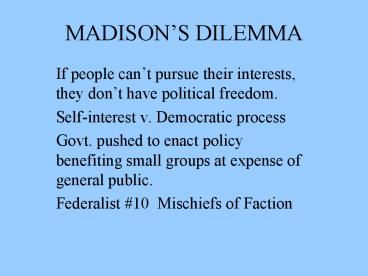MADISONS DILEMMA - PowerPoint PPT Presentation
1 / 15
Title:
MADISONS DILEMMA
Description:
Politics can be understood only by looking at the interaction of groups. ... Refuted critiques of American politics, such as C. Wright Mills' The Power Elite, ... – PowerPoint PPT presentation
Number of Views:252
Avg rating:3.0/5.0
Title: MADISONS DILEMMA
1
MADISONS DILEMMA
- If people cant pursue their interests, they
dont have political freedom. - Self-interest v. Democratic process
- Govt. pushed to enact policy benefiting small
groups at expense of general public. - Federalist 10 Mischiefs of Faction
2
- Prevent factions or control them?
- Are factions normal? inevitable?
- How can they be controlled?
- Madison A republican form of government
- Effects of faction are diluted, or controlled, by
the clash of so many competing interests. - No one interest, or set of interests, would
dominate.
3
- Pluralism 20th century
- Competing interests find representation in
policymaking through lobbying by organizations. - The Madisonian Ideal
- Policymaking the result of compromise and
consensus, with no group becoming too powerful.
Government policymakers act as synthesizers of
competing interests.
4
- Definition of interest group?
- Organizations
- Membership?
- Interests (farmers)
- Interest groups (Natl Assoc of Wheat Growers)
- IG s represent only of potential members, and
only portions of Interests - Lobbying
5
- ROLES
- Represent
- Participate
- Educate
- Agenda building
- Program monitoring
6
- Pluralisms rise and fall
- David Truman, The Governmental Process, 1951
- Group Theory
- Politics can be understood only by looking at the
interaction of groups. - Echoes Madison tendency to form groups around
interests is in the nature of man. - Truman political man is a product of group
influences
7
- Robert Dahl, Who Governs?, 1961
- Different issues/interests generate activism from
different groups of people. No one group comes
together on every issue. - Policymaking influenced by loose coalitions of
groups active on issues they care about. - Policy is made through bargaining and compromise
between activated groups and political elites.
8
- Dahl, and Pluralism, were very influential.
- Dahl added normative aspect This is the way
things should be. - Credited by many for reviving democratic theory,
by providing an explanation and a rationale for
the American political process. - Interest group activity was not only to pursue
self-interest, but actually produced fair and
democratic policy.
9
- Refuted critiques of American politics, such as
C. Wright Mills The Power Elite, 1956. - Pluralism - Government responds to different
groups on different issues they are responsible
to a broad range of constituencies, rather than a
small group of powerful elites.
10
- Influence of pluralism, and Dahls work in
particular, drew attention and scrutiny. - Methodological criticism/too narrow
- Limited cases dont prove government is truly
democratic - Biased questions and misleading conclusions
- Other criticized implications of pluralism
- Defends the status quo
11
- Lobbying groups protect mainly elite interests
- Theodore Lowi Disproportionate privilege leads
to disproportionate influence. - Pluralism falsely suggests equal treatment of all
groups/interests.
12
- Real-world events also questioned validity of
pluralism. - Civil Rights Movement
- Anti-Vietnam War Movement
13
- Pluralism Good
- Elitism Bad
- Pluralisms strength is normative, not
necessarily descriptive. Still a desirable goal. - Cant be dismissed like some rejected theory,
that would dismiss part of the core of American
democracy and constitutionalism.
14
- Pluralism one of the most debated and studied
topics in 20th century. - No new theories have replaced it.
- Why?
- Pluralism also the only theory that resolved the
Madisonian dilemma. - If interest groups dont play a constructive
role, then they are a danger to democracy.
15
- What to do?
- Make pluralism come true.
- Make it more balanced.
- Reduce the role of PACs in campaign financing
- Enhance representation of interests who are
poorly represented - More democracy. More participation in the
political system. - When that happens, the inevitable result is more
interest groups.































